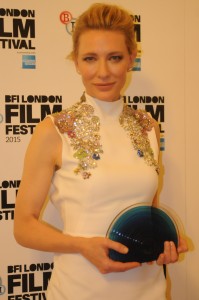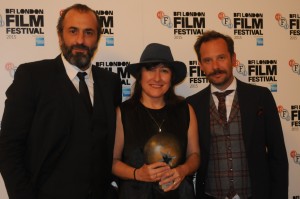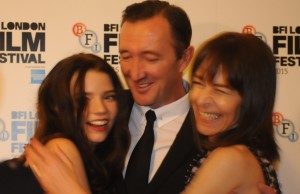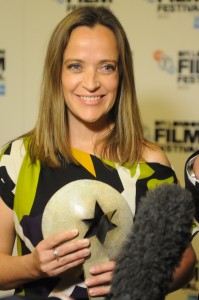
The Oscar-winning actress Cate Blanchett has joined the debate about women’s equality in the film industry – by saying that it’s time to end it.
The Australian star was speaking after being honoured with the prestigious BFI Fellowship, at the end of a London Film Festival that was designed, by its director Clare Stewart, to showcase the best women working in front of and behind the camera.
As its opening night film, the BFI, which runs the festival, picked Suffragette – written, produced and directed by women – and of course about women. The festival included a panel, including the actress Geena Davis, which discussed the issue of women’s equality in the industry. The proportion of films directed by women at the festival has been more than double the proportion on general release. And on the penultimate night of the festival, the top prize in the Official Competition has gone to a female director.

The president of the jury of the Official Competition, a former winner Pawel Pawlikowski, said that Chevalier – a Greek comedy by Athina Rachel Tsangari – was “both a hilarious comedy and a deeply disturbing statement on the condition of western humanity.” Chevalier is ostensibly about male bravado, but that’s now how its director sees it. “It is about a group of males who are equally females, so it’s a film about being human and trying to cope with it.” She said that a female winner sent a strong message and she was extremely honoured, but she said the prize was for her primarily male cast.

The Sutherland Award for the Best First Feature went to the unsettling horror, The Witch, set in 17th Century New England and made by an American director, Robert Eggers. The award was collected by three of the largely British cast, Anya Taylor-Joy, Ralph Ineson – best known until now as David Brent’s best friend in The Office – and Kate Dickie. Asked what made it stand out in a genre that doesn’t often win awards, the group opined that they wouldn’t qualify it as a horror. Ineson said it would be better characterised as “a period character piece.” The jury said The Witch reinvented the horror genre and presented “a fresh, feminist take on a timeless tale.”

Another woman was honoured in the documentary category, with Jennifer Peedom’s Sherpa winning the Grierson Award. The Australian film-maker went to the Himalayas in April last year to make a film about the mountaineering guides, arriving days before sixteen were killed in an avalanche. The judges said her “impressive” film gave “a voice to a previously voiceless community.” Explaining why she wanted to make a film about Sherpas, after receiving her London Star trophy, Peedom said films such as the recent Everest had “almost whitewashed them from history.”
But the highest profile woman of the night was the acclaimed actress Cate Blanchett, who said she was deeply honoured and dumbstruck to be awarded a prestigious BFI Fellowship. Blanchett, who has also appeared in two films at this year’s festival, Carol and Truth, said we seem to have the same conversations about women’s equality every year and it feels a bit like Groundhog Day. “It’s time to say, that’s great – move on,” she said, stressing that pay and opportunities should be the same for men and women and insisting that the many women honoured at this year’s festival were there because they deserved to be.
